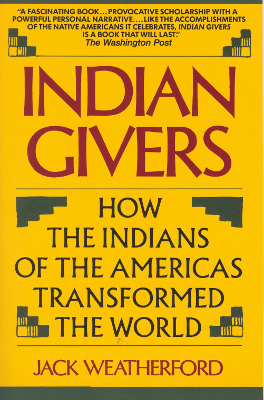
Indian Givers
 Indian
Givers by
Jack Weatherford is a
thought-provoking look at ways contact with Native Americans changed
the face of the rest of the world. For example, Weatherford
suggested that the new crops of potatoes and cotton from the Americas
were the driving force behind Industrialization. The addition of
potatoes to the European diet reduced the amount of grain grown, which
in turn left many mills idle. At the same time, cotton replaced
wool as the fiber of choice for making clothes. Farmers were able
to produce a lot more cotton than wool since sheep require considerable
acreage to graze on, so the bottleneck in the clothing production
process shifted from land to manpower. Wait, didn't we have a
bunch of idle mills lying around just waiting to power a clothing
factory? From the union of potatoes and cotton, Industrialization
was born.
Indian
Givers by
Jack Weatherford is a
thought-provoking look at ways contact with Native Americans changed
the face of the rest of the world. For example, Weatherford
suggested that the new crops of potatoes and cotton from the Americas
were the driving force behind Industrialization. The addition of
potatoes to the European diet reduced the amount of grain grown, which
in turn left many mills idle. At the same time, cotton replaced
wool as the fiber of choice for making clothes. Farmers were able
to produce a lot more cotton than wool since sheep require considerable
acreage to graze on, so the bottleneck in the clothing production
process shifted from land to manpower. Wait, didn't we have a
bunch of idle mills lying around just waiting to power a clothing
factory? From the union of potatoes and cotton, Industrialization
was born.
The book is full of
other agricultural (and non-agricultural) tidbits like the war that
almost broke out between Peru and the young U.S.A over access to guano
for fertilizer, or the tale of how feeding corn to livestock increased
Europeans' dietary intake of animal products and caused a population
boom. On the other hand, many of the author's arguments felt a
bit over-simplified
and biased toward giving complete credit to the Native Americans, and
after I found a few botanical flaws in the book I started to wonder how
carefully the author had done his research. So don't take
anything in this book as gospel, but do read it as a good way to open
your eyes to parts of world history you might have missed learning
about in school.
Want more in-depth information? Browse through our books.
Or explore more posts by date or by subject.
About us: Anna Hess and Mark Hamilton spent over a decade living self-sufficiently in the mountains of Virginia before moving north to start over from scratch in the foothills of Ohio. They've experimented with permaculture, no-till gardening, trailersteading, home-based microbusinesses and much more, writing about their adventures in both blogs and books.
Want to be notified when new comments are posted on this page? Click on the RSS button after you add a comment to subscribe to the comment feed, or simply check the box beside "email replies to me" while writing your comment.
